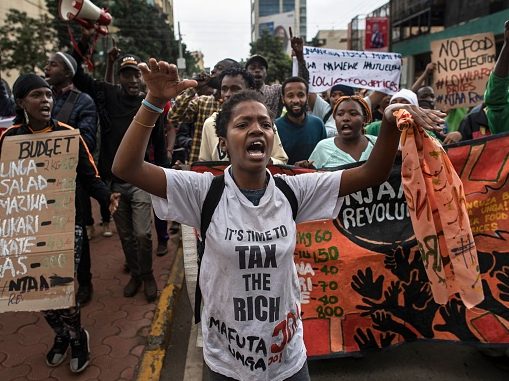European Union leaders have begged those in Africa not to blame the West for the ongoing Global Food Crisis, saying that the current sanctions on Russia shouldn’t be affecting supply.
The blame game for the developing global food crisis has well and truly begun, with senior leaders within the European Union begging their counterparts in Africa not to blame Western powers for chronic shortages of grain and other essential resources such as fertilisers.
It comes as a competing narrative from Moscow which claims that Western sanctions on Russia are what is disrupting the global trade of food appears to be gaining traction in some third-party nations, with EU figures calling claims “misinformation”.
According to a report by POLITICO, European Commission President Ursula von der Leyen was keen to persuade senior African officials that Russia was to blame for any ongoing shortages during a summit on Tuesday.
“It’s a complete misinformation from Russia’s side [that Western sanctions are to blame], the only reason why we are struggling now with a food crisis is because of this brutal, unjustified war against Ukraine,” the Commission President said, before emphasising that she wanted to be “very clear” that Europe has “no sanctions on food and agricultural products”.
However, seemingly in response to similar assertions made by bigwigs in Brussels, African Union chairman Macky Sall said that the narrative that the EU — and not Russia — is to blame for food shortages “is out there”, with many on his continent finding the issue “very serious and alarming”.
Sall also reportedly pressed the issue of Russian banks being thrown off the SWIFT payments system by Western powers, which in turn has hindered the ability of African nations to pay Russia for imported food.
PICS: Bizarre Scenes as Malian Demonstrators Protest Against France, for Russia https://t.co/36vpIE271T
— Breitbart London (@BreitbartLondon) May 15, 2022
As the war in Ukraine rages on, officials in Russia appear to be keen to push the narrative that it is not responsible for the difficulties regarding the global supply of food, with the country’s President, Vladimir Putin, saying that Moscow wishes to work to try and get the likes of grain and fertiliser flowing again.
However, such a commitment would come at a cost to the West, Putin and his officials emphasised, who said that agricultural produce exports from Ukraine would only resume once sanctions imposed against Russia are lifted.
“Vladimir Putin reasonably and on the basis of specific data explained the real reasons for the difficulties in food supplies, which were the result of the erroneous economic and financial policies of Western countries, as well as the anti-Russian sanctions they imposed,” a Kremlin statement published last weekend read.
“For its part, Russia is ready to help find options for the unimpeded export of grain, including the export of Ukrainian grain from the Black Sea ports,” it continued. “An increase in the supply of Russian fertilizers and agricultural products will also help reduce tensions on the global food market, which, of course, will require the lifting of the relevant sanctions restrictions.”
Swedish farmers may be forced to reduce their harvests by as much as half due to a shortage of manure and fertilizers from Russia. https://t.co/cmIowwp820
— Breitbart News (@BreitbartNews) March 20, 2022
In the meantime, it appears that Italian prime minister and former European Central Bank president Mario Draghi is afraid that the West may be losing the crowd.
According to the Italian technocrat, many nations in Africa “are not on the side of the West” when it comes to its conflict in Russia, as reportedly evidenced by their votes in the United Nations.
“Winning the battle of food security for Africa is also important from a strategic point of view … because the thesis that is spread is that a possible famine would depend on sanctions,” POLITICO reports Draghi as saying.
“[I]f you lose the war on food security, there will never be any hope that these countries can come to the side of the alliance, because they will naturally feel betrayed, then whose fault is this is the least relevant issue for them,” he went on to say.
Putin: Ukrainian Sea Mines, Western Sanctions to Blame for Lack of Food Shipments, Not Russia https://t.co/lkDj5iURIA
— Breitbart London (@BreitbartLondon) May 28, 2022

COMMENTS
Please let us know if you're having issues with commenting.